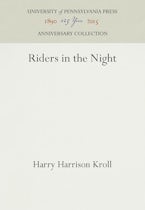It was just before the turn of the century that James B. Duke, after whom Duke University is named, managed to combine nearly all the large foreign and American tobacco interests into a single gigantic trust under the aegis of the American Tobacco Company. His grand enterprise in hand, this son of a one-mule tobacco farmer in North Carolina began an unscrupulous exploitation of the tobacco farmers of Kentucky and Tennessee, depressing prices for their leaf through his utter control of the market. The growers, sorely stricken with poverty, found themselves unable to abide the yet more dismal conditions that Duke's operation brought about, and even less the heedless impositions of power of his hated trust.
Riders in the Night is the story of the revolt of the tobacco growers against the American Tobacco Company, and the organization of a resistance movement known as the "Night Riders," which undertook by whip, firebrand, and gun to break the hold of the "Trust." The sequence of most active violence spanned three years. The "Hillbillies," growers who continued to deal with the Trust, were forcefully brought into the fold and made to take the secret oath of the Riders. The folk of the hills and hollows met in schoolhouses, churches, and at crossroads and united against the Trust and the law-and-order-minded townspeople to do by violence what the slow-moving law in Washington was not doing—restore competition to the tobacco market.
In this book are vividly depicted the capture of towns, the incendiarism of millions of dollars in Trust tobacco, midnight floggings, the destruction of crops, and the personal tales of many of the individuals who labored and fought on both sides. Harry Harrison Kroll writes from the point of view of an eyewitness and provides the pungent scenes and dialogues that do not usually find their way into history. His book is not only an accurate delineation of the largest violent uprising in United States history short of the Civil War, but offers an intimate sense of life in tobacco country.

